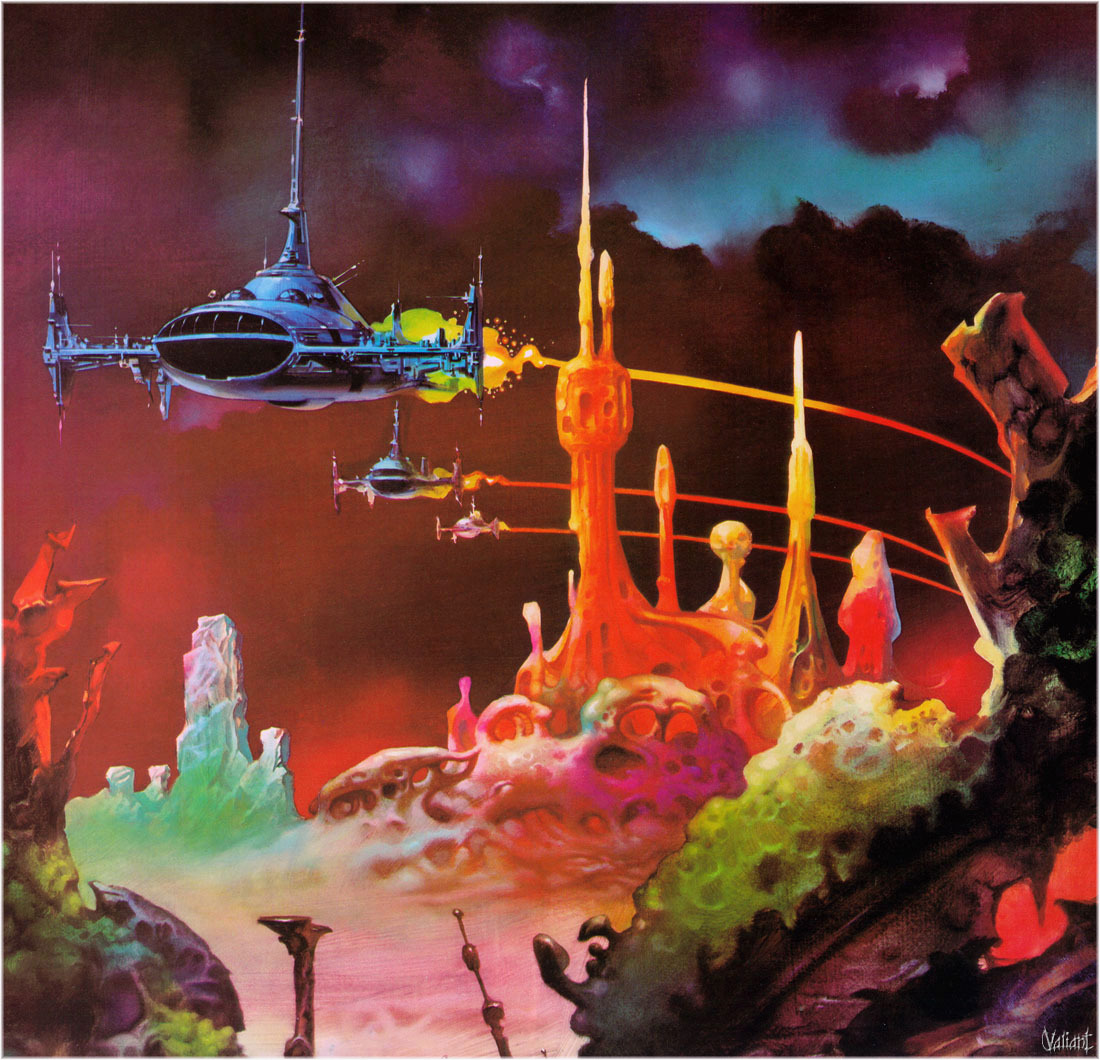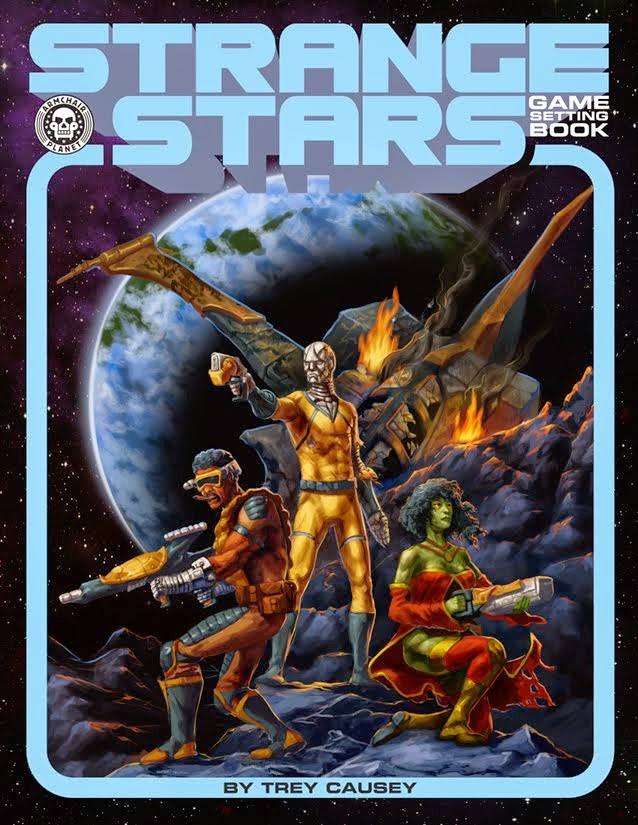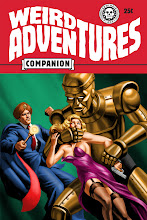1 hour ago
Friday, February 13, 2015
Love Is The Drug
Even in the far future of Strange Stars love remains a somewhat fuzzy concept. Sex, on the other hand...
Anyway, in honor of Valentine's Day, revisit the Pleasure Domes of Erato or spend some time with the alluring Minga.
Thursday, February 12, 2015
Random Planets
There are a lot of good planet generators in science fiction rpgs from the very science-minded ones in GURPS Space and the original version of 2300AD to the more adventure-oriented ones of Stars Without Number and Starblazer Adventures, with Traveller and others somewhere between the two poles. None of these really focus on the quick creation of the sort of cliched (and I don't mean that negatively) worlds that populate pulpy or comic book space opera and space fantasy.
I've been toying with working on a series of random generators for exactly those sorts of settings. A more granular series of tables is probably to come, but I wanted to present an alternative "quick stock planet" alternative list first:
- Amazon Planet: Women warriors who either have no males or keep them in as slaves. The opposite is the misogynistic Man's World. The lack of the other sex may result from a Secret.
- Anachronistic World: Strangely resembles a historical Earth period, culture, genre, or work of fiction.
- Bucolic Backwater: A sleepy agrarian world where no one expects anything interesting to happen. Its native culture or cultures are likely to be irritatingly quirky.
- Casino World: Vegas in space.
- Crossroads World: A myriad of races and cultures congregate for trade, religious pilgrimage, or the like.
- Desert Planet: Whether hot or cold, this world is bone dry and harsh. Better to stick to the few oasis or canal cities and stay away from the volatile, deep desert-dwellers.
- Ecumenopolis: A planet-spanning city.
- Forest/Jungle Planet: Titanic trees (and possibly tree-towns) and an over-abundance of wildlife.
- Hellworld: Incredibly hostile environment whether due to ultra-deadly fauna, toxic atmosphere, poisonous biosphere or some other factor. There is always a good reason to travel here, however.
- Ice World: Sheathed in thick glaciers, this planet's inhabitants are inured to cold or live in compounds protected from the elements.
- Junk World: Detritus from an ancient civilization (or a current one) covers this world.
- Pleasure Planet: A world famous, or infamous, for its hedonistic pursuits. Likely a vacation destination.
- Paradise Planet: An idyllic world, either obviously highly advanced or hiding behind a faux-primitivism. where all wants and needs are fulfilled. Of course, that may just be how things appear and it is, in fact, a False Paradise.
- Prison Planet: The most notorious criminals in the galaxy are kept here, possibly with political prisoners. Likely to somewhat inhospitable natively, otherwise it would be used for another purpose.
- Ruined World: A post-apocalyptic planet, scarred by the fall of a previous civilization, perhaps long ago, perhaps relatively recently.
- Swamp World: Humid and fetid; full of things that slither and crawl.
- That’s No Ordinary Planet! Roll on the sub-table below.
- War World: Inhabitants have been locked in an age old conflict between two blocs, factions, or a neighboring world. The landscape is devastated and the people mistrustful, heavily armed, and possibly mutated.
- Water World: Planet-spanning oceans with floating cities or mer-folk.
- Wild World: Only rudimentary civilization at best, but plenty of dangerous megafauna.
That's No Ordinary Planet! Sub-table
- It's alive
- It's artificial
- It's a gigantic spaceship
- It's a petrified giant
- It's an egg
- It's a shell around a slumbering space god-monster.
Wednesday, February 11, 2015
Wednesday Comics: Multiversal Spotlight: Earth-38
Earth-38
Apparent Concept: Earth Generations.
Pictured: (left to right) The Bat-Man from 1938 (Bruce Wayne), Supergirl (Kara Kent), Knightwing (Clark Wayne), Batman in the 80s (Bruce Wayne, Jr.), Superman from 1938 (Clark Kent), Joel Kent.
Sources: Superman & Batman: Generations (1999), Superman & Batman: Generations 2 (2001), and Superman & Batman: Generations 3 (2003).
Analog: The world of Generations was designated as Pre-Crisis Earth-3898 in Absolute Crisis on Infinite Earths (2006).
Comments: The three Generations limited series were written and drawn by John Byrne. The series follow Superman and Batman and their respective families from their first meetings as kids to the future. Here's a good article on the series, including a family tree.
The first appearance of the Generations universe is actually a crossover with Marvel: Batman & Captain America. The epilogue has Batman and Robin rescuing Captain America from the ice in the 1960s. The Robin depicted has red hair, suggesting he is the Bruce Wayne, jr. Robin from Generations.
Apparent Concept: Earth Generations.
Pictured: (left to right) The Bat-Man from 1938 (Bruce Wayne), Supergirl (Kara Kent), Knightwing (Clark Wayne), Batman in the 80s (Bruce Wayne, Jr.), Superman from 1938 (Clark Kent), Joel Kent.
Sources: Superman & Batman: Generations (1999), Superman & Batman: Generations 2 (2001), and Superman & Batman: Generations 3 (2003).
Analog: The world of Generations was designated as Pre-Crisis Earth-3898 in Absolute Crisis on Infinite Earths (2006).
Comments: The three Generations limited series were written and drawn by John Byrne. The series follow Superman and Batman and their respective families from their first meetings as kids to the future. Here's a good article on the series, including a family tree.
The first appearance of the Generations universe is actually a crossover with Marvel: Batman & Captain America. The epilogue has Batman and Robin rescuing Captain America from the ice in the 1960s. The Robin depicted has red hair, suggesting he is the Bruce Wayne, jr. Robin from Generations.
Monday, February 9, 2015
Audience Participation
With Strange Stars out for a few weeks now (and reviews appearing), enough time has probably past that I can query folks as to what they'd like to see here on the blog to further explore the setting. So, what would you like to see next?
One thing I haven't talked about yet is the League of Habitats (other than Circus and a brief mention of High Lonesome). I could elucidate more on time frames for hyperspace travel or earlier historical eras like the Archaic Oikumene or the Radiant Polity. Then there's always more practical stuff like currency or sample names for more cultures. I did a post a while back getting very specific about inspirations for particular cultures, and I could always do something like that again.
Those are my ideas but you may have others. So what would you guys like to see? Comment here or drop me an email with suggestions!
One thing I haven't talked about yet is the League of Habitats (other than Circus and a brief mention of High Lonesome). I could elucidate more on time frames for hyperspace travel or earlier historical eras like the Archaic Oikumene or the Radiant Polity. Then there's always more practical stuff like currency or sample names for more cultures. I did a post a while back getting very specific about inspirations for particular cultures, and I could always do something like that again.
Those are my ideas but you may have others. So what would you guys like to see? Comment here or drop me an email with suggestions!
Sunday, February 8, 2015
Names in the Strange Stars
Obviously, you can use whatever names you want for the members of the various clades and cultures in Strange Stars, but here are some examples/guidelines for making up names on the fly for members of the Vokun Empire that fit with the examples given in the setting book:
Vokun
High status Vokun names are multi-syllabic tend to end in -esh or a vowel. Female names are more likely to tend in a vowel and tend to be slightly shorter. Lower class Vokun names are shorter (generally two or three syllables). It is a grave insult to give a Vokun a nickname or otherwise shorten their name without permission.
Examples:
Female: Artazosthra, Ishramis, Jannaxa.Valakasta,Yazdaneshta, Zarshanta, Zrazdakai
Male: Axangavazda, Ksurukandesh, Makathryavu, Tehuteshada, Vahupareshta, Zrayangashamesh
Engineers
Engineers use long designation codes that provide information on expertise, location, and genetic lineage. At the Vokuns' insistence, Engineers use a base designation of one or two syllables with other sophonts.
Examples: Aznat, Enek, Inaat, Ikatik, Mnazek, Ndzat, Omnak, Tlek
Ibglibdishpan
Names of the ibglibdishpan are composed on two, monosyllabic elements that end in a vowel, n, ng, m, l, r, sh or rarely b. Among themselves they employ numerical family designation that is placed before the personal name, but they rarely use these when dealing day to day with other cultures, except in formal situations.
Examples: Chun Ri, Gan Yul, Ro Nar, Ang Tu, Tan Em, Ib Kan, Li Pan.
Kuath
Kuath have a singular, gendered personal name.
Examples:
Male: An-Tuani, Cham-Ka, Hulan-Yi, Konaga, Ngata, Sungoro, Tanathi, Waruahi
Female: An-San, Chanya, Dara-Ja, Miri, Shu-sheng, Susi, Ulathi
Surnames: Aranun, Haunahi, Hokuni, Kamata, Nohoka, Pomaku, Tutani
Female: Ahilani, Aonami, Elaheli, Hani, Ko’ana, Mululani, Poma, Uku
Male: Atamu, Aonga, Hukono, Isako, Kamaki, Rano, Tuati, Yano, Uko
Vokun
High status Vokun names are multi-syllabic tend to end in -esh or a vowel. Female names are more likely to tend in a vowel and tend to be slightly shorter. Lower class Vokun names are shorter (generally two or three syllables). It is a grave insult to give a Vokun a nickname or otherwise shorten their name without permission.
Examples:
Female: Artazosthra, Ishramis, Jannaxa.Valakasta,Yazdaneshta, Zarshanta, Zrazdakai
Male: Axangavazda, Ksurukandesh, Makathryavu, Tehuteshada, Vahupareshta, Zrayangashamesh
Engineers
Engineers use long designation codes that provide information on expertise, location, and genetic lineage. At the Vokuns' insistence, Engineers use a base designation of one or two syllables with other sophonts.
Examples: Aznat, Enek, Inaat, Ikatik, Mnazek, Ndzat, Omnak, Tlek
 |
| Art by Garrisonjames |
Names of the ibglibdishpan are composed on two, monosyllabic elements that end in a vowel, n, ng, m, l, r, sh or rarely b. Among themselves they employ numerical family designation that is placed before the personal name, but they rarely use these when dealing day to day with other cultures, except in formal situations.
Examples: Chun Ri, Gan Yul, Ro Nar, Ang Tu, Tan Em, Ib Kan, Li Pan.
Kuath
Kuath have a singular, gendered personal name.
Examples:
Male: An-Tuani, Cham-Ka, Hulan-Yi, Konaga, Ngata, Sungoro, Tanathi, Waruahi
Female: An-San, Chanya, Dara-Ja, Miri, Shu-sheng, Susi, Ulathi
Yantrans
Yantrans use a personal name and a family name. The family name is typically given first.
Examples:Surnames: Aranun, Haunahi, Hokuni, Kamata, Nohoka, Pomaku, Tutani
Female: Ahilani, Aonami, Elaheli, Hani, Ko’ana, Mululani, Poma, Uku
Male: Atamu, Aonga, Hukono, Isako, Kamaki, Rano, Tuati, Yano, Uko
Voidgliders
Voidglider names are typically radio-communicated are not readily translatable to the phonemes of other clades. Nicknames are often employed by other species, and voidgliders will refer to each other with "translated" names.
Examples: Solar Wind, Luminous Object, Distant Star, Freefall Warrior, Far Glider, Blue Shift.
Voidglider names are typically radio-communicated are not readily translatable to the phonemes of other clades. Nicknames are often employed by other species, and voidgliders will refer to each other with "translated" names.
Examples: Solar Wind, Luminous Object, Distant Star, Freefall Warrior, Far Glider, Blue Shift.
Thursday, February 5, 2015
Strange Stars Update
With both the pdf and the hardcopy of Strange Stars out, it finally got it's first review from Eric over at the Swords & Stitchery blog. I did an interview with Chris Kutalik (author of Slumbering Ursine Dunes--on sale now!) over at the Hill Cantons blog, wherein we discuss the (probably not so secret) inspirations for Strange Stars. Right here on this blog, I've updated the Strange Stars Index page. Those updates include the last couple of posts before the release of the book and the posts I've done on adventuring in the the setting since its release.
Just because the book's out, we're not resting on our laurels. More posts are to come here and some Fate system book excerpts on John Till's Fate SF blog. Yesterday, he talked about his inspirations when writing for Strange Stars.
Just because the book's out, we're not resting on our laurels. More posts are to come here and some Fate system book excerpts on John Till's Fate SF blog. Yesterday, he talked about his inspirations when writing for Strange Stars.
Wednesday, February 4, 2015
Wednesday Comics: Multiversal Spotlight: Earth-37
The Multiversity Guidebook came out a couple of weeks ago, giving new information on the 52 Earths of the current DC Multiverse as envisioned by Grant Morrison. If you're reading Multiversity and inclined to skip this because it's just a guide book, you should reconsider as there is a bit of story there. Even if you haven't been reading Multiversity, but you're a fan of the DC multiverse you should check it out. Many of them were the old standbys we've seen since the earliest days of the Pre-Crisis Multiverse. Some are of much more recent vintage:
Earth-37
Apparent Concept: Earth Chaykin
Pictured: (left to right) Robin (Rickart Graustark), Batgirl (Barbara Gordon), Joker (Bianca Steeplechase), Star Hawkins, Tommy Tomorrow, Iron-Wolf.
Sources: Weird Worlds (1972) #8-10; Twilight #1-3 (1990) and presumably Ironwolf: Fires of Revolution (1999); Thrillkiller #1-3 (1997) and Thrillkiller '62 (1998), collected here.
Analogs: The world of Thrillkiller was designated as Pre-Crisis Earth-61 in Absolute Crisis on Infinite Earths (2006); Post-52, Thrillkiller characters were shown as being on Earth-37 in Countdown: Arena #1 (February 2008).
Comments: Twilight was a re-imagining or Watchmen-izing of a number of DC's future nonsupers characters. It's unclear if the non-Twilight versions exist anywhere in the current Multiverse. Chaykin created Ironwolf in Weird Worlds and he gets referenced in Twilight, though never seen. We can assume he would be a different version.Then, years later, John Francis Moore and Chaykin wrote an Ironwolf graphic novel that altered his world a bit and represented some of the events of the Weird Worlds stories. The graphic novel is clearly intended to be in the world of Twilight, but it doesn't seem to jibe with the off-hand references to Ironwolf in that story! Ironwolf as pictured above looks like he did in his original 70s appearances, for what its worth.
Earth-37
Apparent Concept: Earth Chaykin
Pictured: (left to right) Robin (Rickart Graustark), Batgirl (Barbara Gordon), Joker (Bianca Steeplechase), Star Hawkins, Tommy Tomorrow, Iron-Wolf.
Sources: Weird Worlds (1972) #8-10; Twilight #1-3 (1990) and presumably Ironwolf: Fires of Revolution (1999); Thrillkiller #1-3 (1997) and Thrillkiller '62 (1998), collected here.
Analogs: The world of Thrillkiller was designated as Pre-Crisis Earth-61 in Absolute Crisis on Infinite Earths (2006); Post-52, Thrillkiller characters were shown as being on Earth-37 in Countdown: Arena #1 (February 2008).
Comments: Twilight was a re-imagining or Watchmen-izing of a number of DC's future nonsupers characters. It's unclear if the non-Twilight versions exist anywhere in the current Multiverse. Chaykin created Ironwolf in Weird Worlds and he gets referenced in Twilight, though never seen. We can assume he would be a different version.Then, years later, John Francis Moore and Chaykin wrote an Ironwolf graphic novel that altered his world a bit and represented some of the events of the Weird Worlds stories. The graphic novel is clearly intended to be in the world of Twilight, but it doesn't seem to jibe with the off-hand references to Ironwolf in that story! Ironwolf as pictured above looks like he did in his original 70s appearances, for what its worth.
Subscribe to:
Posts (Atom)











%2B001-049-Earth-37.jpg)





